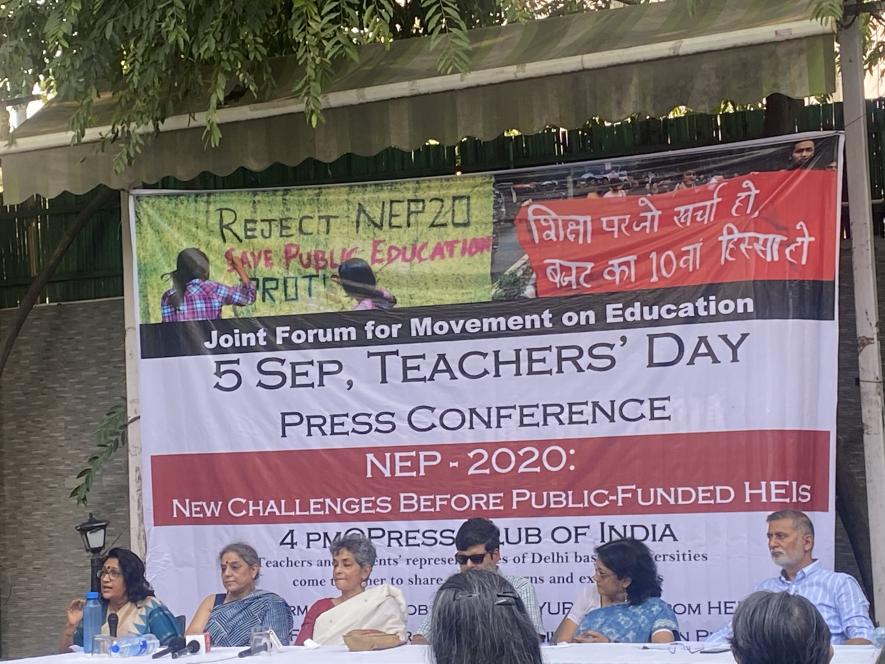Professors’ Forum Flags Concerns over ‘Anti-Teacher’ NEP on Teacher’s Day

New Delhi: On September 5, which is celebrated every year as Teacher’s Day, several faculty members of colleges and universities held a press conference at the Press Club of India to flag concerns over the “anti-teacher” National Education Policy (NEP) of 2020.
The government wants to throw teachers off the teaching profession by emphasising digitisation, alleged the Joint Forum for Movement on Education (JFME), an umbrella body of teachers and student organisations from different universities, including Delhi University, Jawaharlal Nehru University, Jamia Milia Islamia University and Ambedkar University Delhi.
They alleged that the Union government wants to “hand over the entire education system to corporates” and they fear degrading conditions for teachers following the imposition of NEP.
“We are seeing the abysmal condition teachers are in. Education has never been in the bad state that it is today. Teachers are struggling for regular employment and are worried about their service conditions,” said Nandita Narain, associate professor at St. Stephen’s College and Chairperson of JFME.
“On this Teacher’s Day, we want the government to stop saying ‘Happy Teacher’s Day’ and actually withdraw this anti-teacher policy that is the NEP,” she added.
What is NEP 2020?
The NEP, approved by the Union Cabinet in 2020, replaced the 34-year-old National Policy on Education framed in 1986; the new policy aims at paving the way for transformational reforms in school and higher education systems to make India a global knowledge superpower.
However, teachers and students across the country have raised concerns about the NEP and have flagged gaping holes in the policy that are in contrast with what it actually claims.
Critique Against NEP
The forum highlighted several discrepancies in the policy, and it further alleged that more and more disparities are being unfolded in the policy as they look deeper into it.
“If we look at our own University, without thinking and without any preparations, a four-year undergraduate programme has been initiated. That has a massive dilution. The paper, which we could barely teach in five periods, we are now required to teach that in three periods. Your social academic credits have been significantly reduced,” Narain pointed out.
Under the new policy, students cannot opt for ‘English’ as an option under the ‘Compulsory Language’ in a multilanguage course. Narain believes that where you don't have teachers to teach Indian Languages, teaching Hindi is the only alternative. “In a central university, it is unfair to students who come from different parts of the country and abroad to study,” Narain noted.
She also alleged that, under the new policy, teachers are worried about their pensions, making their lives precarious. “Now, it is also being done to throw them out of the education sector. In the name of student-centric policy, it is trying to throw teachers out of education itself,” Narain added.
Apoorvanad, a professor at the Hindi department at Delhi University, alleged that teachers are defamed across universities.
“When the NEP came, people were told that the plan was to make education student-centric. But the real aim was to remove teachers from the equation. Over the past several years, teachers have been defamed. People have been told that teachers are wasting taxpayers’ money. So now, teachers are being targeted,” he claimed.
Nivedita Menon, a political scientist and professor at Jawaharlal Nehru University (JNU), asked why this level of scam was not making headlines in India. This is the first time that no admissions have been made to central universities this year. “The first time it happened in the history of Independent India was because of Covid and this time is it because of another virus- the NEP through which the government intends to destroy higher education in India,” she alleged.
She further claimed that universities are being attacked and slandered because universities and places of higher education have always been at the forefront of fighting crony capitalism and Hindu Rashtra.
“The NEP intends to remove education from the control of academics, hand it over to big corporate entities and not make it possible for more students to have access to education,” Menon added.
Further, the policy promotes Multiple Choice Questions (MCQs)-based entrance tests. “How many MCQs can be formulated? Who will formulate them? Every centre needs to have about five different sets of question papers so that several batches of students can come and write them. Who will create question banks? We need to understand that the MCQ mode of functioning is actually about people making money. Private companies will set questions now. People who are in that job for profit will set entrance exam questions now, and that is the point of NEP,” Menon alleged.
The NEP was not passed in the Parliament and was not discussed in the parliament, preventing the states to have anything to do with the policy when, in fact, Education is a matter under the state governments.
A Higher Education Funding Authority (HEFA) was set up without discussing it in the parliament, and it is not even mentioned in the NEP. However, the HEFA is already functioning. HEFA gives ‘loans’ to universities instead of giving ‘grants’ to the University Grants Commission (UGC). Universities are now required to pay back these loans with interest. Invariably, universities will have to increase fee structures and take money from private entities to repay these loans.
“Fees in the colleges will increase as NEP promotes privatisation. Now private players will decide the fee structures. They want to stop people from thinking. Students will sit in their homes and watch online videos. There will be no community. People learn from discussions. The idea is to end the university as a community,” Menon said.
The government does not want to bear the expenses of teachers now, alleged Professor Poonam Batra of Delhi University (DU).
“They are pushing towards digitisation. You can study everything online. You can do multiple courses from different universities online. You don’t need teachers,” she added.
The forum has vowed to intensify the struggle against the NEP till the policy is rolled back.
Get the latest reports & analysis with people's perspective on Protests, movements & deep analytical videos, discussions of the current affairs in your Telegram app. Subscribe to NewsClick's Telegram channel & get Real-Time updates on stories, as they get published on our website.
























